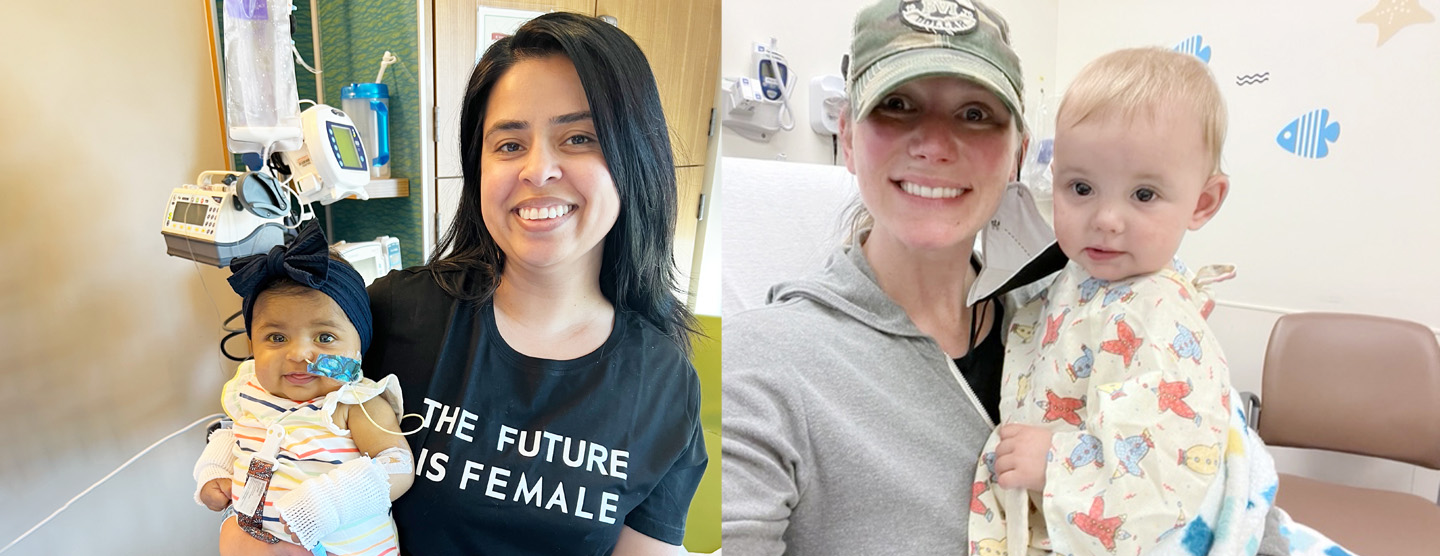
Liver Transplant Program
The Pediatric Liver Transplant Program is one of the nation's leading liver transplant centers. We helped pioneer techniques that have made transplantation safer and more successful and are at the forefront of research to improve the survival and long-term quality of life for transplant recipients.
We know organ transplantation can be a stressful journey. Our patient care navigators will help guide you and your family through the process and connect you with the specialists you need. Together, we provide expert care every step of the way, from diagnosing and managing your child's illness to negotiating the wait for a donor, and from surgery through post-transplantation care.
Expertise
Our center is one of the longest-running liver transplant programs in the U.S. We've performed more than 4,500 liver transplants in adults and children, with survival rates that are among the country's best.
We were among the first in the nation to perform liver transplants using live donors and now have one of the largest such programs in the country — earning us a center of excellence designation from the U.S. Department of Health and Human Services.
The center's multidisciplinary team of experts includes transplant surgeons, gastroenterologists, hepatologists, infectious disease physicians, anesthesiologists and pharmacologists, as well as nurses, social workers and other support staff. With more than half of our transplant patients under the age of 2, we are experienced with the youngest of patients.
Wait times
Our team advocates for patients and their families in partnership with national and international transplant organizations, providing education and support throughout the wait for a new liver.
When possible, we use techniques that enable children to receive transplants more quickly and safely than at other institutions, such as split-liver transplants (dividing a donor liver between two recipients) and living donor transplants. This not only reduces the wait time for a liver, but also increases the chances that the transplant will succeed.
As a result, our patients spend less time waiting for a new liver and enjoy higher survival rates while on the waitlist than the national averages. Using a living donor also improves the chances that the transplant will succeed.
Survival and outcomes
Our survival rates are consistently among the highest in the country, even though we treat some of the most seriously ill patients. Children who receive a conventional liver transplant (from a deceased donor) at UCSF have a survival rate of 95 percent one year after transplant and 92 percent three years after transplant.
The rates are even higher in those who receive livers from living donors, with a 100 percent survival rate for both patients and the transplanted livers three years after transplantation. Our program also has one of the lowest retransplantation rates (the percentage of patients who need a second transplant) in the country.
*More outcome data is available from the Scientific Registry of Transplant Recipients and from the Organ Procurement and Transplantation Network.
Post-transplant care
Our care doesn't end with surgical recovery. With expertise in managing the immune-suppressing medications patients take after transplant (to prevent the body from rejecting the new liver), we work to minimize or even eliminate the need for these drugs over the long term.
We monitor both the function of the transplanted liver and our patients' overall growth and development throughout their childhood and into early adulthood.
Clinical trials and research
The UCSF pediatric liver transplant team leads numerous clinical trials and other research projects that aim to improve the care, long-term health and quality of life for children with chronic liver conditions, including those receiving liver transplants. To learn more, see our research initiatives below.
Our locations (4)
Our team
-

Kate Cheng
MD
Gastroenterologist and liver specialist -

Christopher E. Freise
MD, FACS
Organ transplant surgeon -

James M. Gardner
MD, PhD, FACS
Organ transplant surgeon -

Sang-Mo Kang
MD
Organ transplant surgeon -

Manjiree Vikas Karandikar
MD
Pediatric infectious disease specialist -

Irfan Kathiriya
MD
Anesthesiologist -

Anne Lyon
MD
Hepatologist and gastroenterologist -

Sarah L. Maxwell
MD
Pediatric gastroenterologist and hepatologist -

Prita Mohanty
MD
Pediatic gastroenterologist and hepatologist -

Hung Gia Nguyen
MD
Anesthesiologist -

Emily R. Perito
MD, MAS
Gastroenterologist and liver and pancreas specialist -

Lynn Ramirez
MD
Pediatric infectious disease physician -

Sue Rhee
MD
Gastroenterologist and liver specialist -

John P. Roberts
MD
Organ transplant surgeon -

Garrett R. Roll
MD, FACS
Organ transplant surgeon -

Philip Rosenthal
MD
Pediatric hepatologist -

Jina Sinskey
MD
Pediatric anesthesiologist -

Shareef Syed
MBChB
Organ transplant surgeon -

Sharad I. Wadhwani
MD, MPH
Pediatric gastroenterologist and hepatologist -

Stephen Dwight Weston
MD
Anesthesiologist -

Lisa Gallagher
NP, MSN
Pediatric nurse practitioner -

Liz McMillan
RD
Dietitian -

Makiko Omori
RD
Dietitian
Awards & recognition
-

Ranked among the nation's best in 11 specialties
-

One of the nation's best for gastroenterology & GI surgery
Clinical trials
US National OCS Liver Perfusion (OLP) Registry
Recipients' patient and graft survival rates will be the primary clinical outcomes measures for all OCS Liver transplanted recipients compared to recipients receiving liver transplants using non-OCS preservation methods (cold stat...
Recruiting
More about this studyPatient stories
Children with biliary atresia thrive after transplants
Two mothers became living donors for their babies, Sahej and Frankie, who were diagnosed with a life-threatening liver condition shortly after birth. Both are now thriving.
Plan your visit
What to Bring
- Photo I.D.
- Health insurance card
- Insurance authorization, if required
- Doctor's referral, if required
- Recent test results related to your child's condition
- List of medications, including dosages, plus any your child is allergic to
- List of questions you may have
- Device or paper for taking notes
Support services
Our research initiatives
Feeling at home
From bedside bingo to therapy dogs, we're here to help kids smile and feel more like themselves.
Visit Child Life services



















































